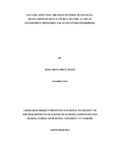| dc.description.abstract | Governments are fundamentally different from business enterprises because they have
different purposes, processes of generating revenues, stakeholders, budgetary
obligations and propensity for longevity. These differences require separate
accounting and financial reporting standards in order to meet the needs of the
stakeholders who assess the government’s ability for accountability and socioeconomic
development. The study sought to determine the factors for effective
implementation of financial regulations in government ministries in Kenya. This
study was conducted through the use of a descriptive design. The target population of
the study were the heads in the finance and accounting departments in the 18
ministries and the 47 state owned enterprises in Kenya that are non-commercial. The
study used questionnaires for primary data collection. The questionnaires were
administered through drop and pick-later method to the sampled population. Data
collected was purely quantitative and it was analyzed by descriptive analysis. The
descriptive statistical tools such as SPSS V 21.0 and MS Excel helped the researcher
to describe the data and determine the extent used. Tables and charts were used to
summarize responses for further analysis and facilitate comparison. In addition, the
researcher conducted a multiple regression analysis so as to determine the effects of
each of the independent variables. The study revealed that commitment by the
relevant Ministry to creating a strong, efficient capable regulatory agency affect
effectiveness of financial regulations in Kenya’s public sector. The study also
revealed that availability of finances for the regulator, sufficiency of capacity to deal
with the regulated entities, poor remuneration of employees and employees being
biased towards the regulated with interests of future employment affect financial
regulations in Kenya’s public sector. The study concluded that political interference,
poor relations between the regulating agencies and the regulated entities, state
infringing on regulatory jurisdiction and appointment of non-autonomous individuals
affect the effectiveness of financial regulations in Kenya’s public sector. The study
recommends that the government should ensure the establishment of strong regulatory
agencies that are independent. The study further recommends that all the employees
in the regulatory agencies should be remunerated well. This study focused on the
factors for effective implementation of financial regulations in government ministries
in Kenya. Another study could be done to establish the challenges faced in the
implementation of financial regulations | en_US |

